by Steven Lipman
Updated for 2023
As you may know, Boston is BIG in education.
Some of the world’s most prestigious colleges and universities call Boston home. Harvard University, Boston University, the Massachusetts Institute of Technology, and Berklee College of Music are all part of the Boston education ecosystem. It’s no wonder that students from all over the world flock to the city for their higher learning journeys.
As someone who is exploring music education in the Boston area, it can be hard to know which program or school will be best for you. That, my friend, all depends on your particular educational goals.
I’ll put it simply – if you literally live and breathe music and can’t see yourself doing anything else with your life, you may want to attend a music school.
But, if you are considering a more standard academic educational journey and wish to incorporate music into your learning, a university with a music program may be the best option for you.
With my decades working in music college admissions, I understand that some students are part of the first group, while others are part of the second group. Knowing which group you are in depends on taking an honest look at your career goals and level of skill.
Career and Life Goals
If you’re going to college or university, your future is everything to you. Understanding what you want that future to look like is part of exploring your options.
Pursuing a career in music often requires years of study, private lessons, and an immersion into your chosen instrument or discipline. For instance, if you wanted to be a working studio guitarist, you can bet that you better know your music theory, how to sight read, and be exposed to many different forms of music.
Alas, there are many students who don’t necessarily want to live and breathe music, or who do not have the skill level to get into the top music schools we have in Boston. Some students in this group take on a liberal arts education, with a blend of academic courses and music classes.
NOTE: What many prospective students don’t consider is that many large universities have music programs that – although they are not the most competitive – will suit students who simply want to learn more about music.
Skill Level
The amount of skill you have in your chosen discipline is everything when considering whether or not to study music.
This is because for all Boston music schools you’re required to pass an audition. And these auditions – for the best, to be certain – are very competitive.
In my years at Berklee, I would come across students who began pursuing their chosen musical discipline as early as elementary school, and others who began later in life. Either way, those who put overwhelming amounts of work into their musical abilities made the cut, while others were passed along.
If you’re more of a casual player, you may be asking yourself if it’s worth it to study music at all. For those students, I might say a university or a liberal arts college with a music program might be the best bet.
As part of my current mission to help students get into conservatories, music schools, and music programs, I look at the individual abilities of music school hopefuls and steer them onto the path that will best suit their aspirations. With mock auditions, an analysis of your abilities, and more, I strive not to get you into the best music program, but the right one for you.
This approach sets up the applicants I serve for success, and helps them make the best choice possible for their particular journey. If you’re curious about where you stand, contact me today.
And now, without further ado, here are my recommended music schools and music programs -in no particular ranked order – in Boston, and who might be right for them.
1. Berklee College of Music
You may think I am biased – I was director of admissions here – but Berklee College of Music is considered one of the best contemporary music schools in the world. People from all over vie for limited space to attend and train under faculty who are verifiable masters in their chosen field.
This choice is for students who in no uncertain terms cannot live without music. They’ve practiced for many years, and feel confident that they can make a case for their admissions in a competitive audition process.
The course of study is rigorous, which makes graduating a difficult journey – but, if you are the right student for the school there’s no doubt you can succeed.
If you’re considering any of the following career paths, you may want to put Berklee on your list:
- Professional Musician or Songwriter
- Composer or Film Scorer
- Studio Musician
- Music Producer/Audio Engineer
While you can study and work with a wide variety of music genres, Boston Berklee College of Music is best for jazz, popular music, rock and roll, and other contemporary forms.
Further, Berklee has a partnership with Harvard University. This allows you to obtain a Bachelor of Arts from the university in three years, then be awarded a Master of Music or Master of Arts degree from the music college after two years.
This particular program is extremely difficult, and the enrollment rate for it is very low – yet, this allows you to also take specific classes while attending Harvard. You must apply to both schools, and be accepted by both.
Additionally, if you are considering music therapy or music education as a major, Berklee is known to have the best in Massachusetts.
2. Boston Conservatory at Berklee College of Music
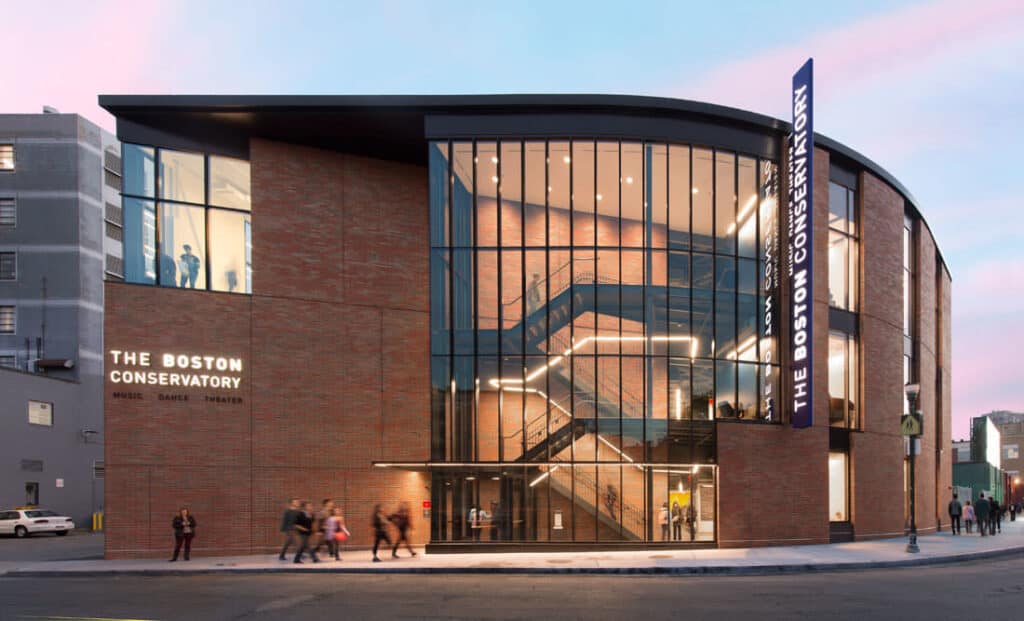
The Conservatory is another option for students who are seriously considering music degrees that will launch them on the path to a successful musical career.
Music students at this Conservatory are often training in classical music performance and composition – more contemporary forms such as jazz and popular music are more the focus of Berklee as stated above.
This is another school where attending students often see themselves as professional working musicians in their future.
Other performance-based degree programs are best studied at the Conservatory. These include contemporary dance, along with musical and contemporary theater.
NOTE: If you attend the Boston Conservatory of Music, you are also able to take specific classes at Berklee, and vice versa.
3. The New England Conservatory of Music
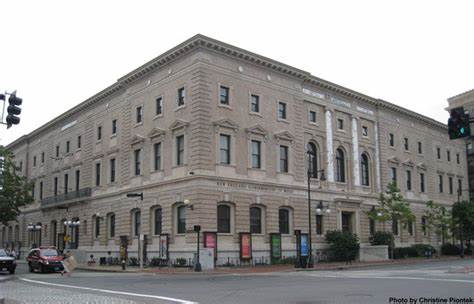
The New England Conservatory of Music
The oldest independent music school in the United States, the New England Conservatory of Music has been creating world-class musicians since the mid-19th century.
Classical, jazz, and contemporary improvisation majors – performance, composition, and otherwise – are well-served at this conservatory. Especially for classical and chamber music players, it’s important to note that this school is considered a training ground for the Boston Symphony Orchestra. In fact, most of the faculty are currently practicing members of the BSO.
The contemporary improvisation major is one of the major standouts of the NEC. This hybrid major is revolutionary in the music education world – it brings classical and jazz players together to develop improvisational mastery from both sides of the river.
Many of the students I serve find themselves at the New England Conservatory because they’ve been practicing their instruments for years before attending. The highly competitive live audition is not for students who are uncertain about their abilities.
Much like Harvard and Berklee, NEC maintains a partnership with Harvard University and Tufts University.
A five-year dual degree program at Harvard allows you to obtain a Bachelor of Arts from the university and your Master of Music degree from the conservatory. You must apply to both schools, and be accepted by both.
With the Tufts dual degree program, you receive a Bachelor of Arts or Bachelor of Science from the university, and a Bachelor of Music from the conservatory. For this program, you must also apply to both schools, and be accepted by both.
4. The Longy School of Music of Bard College
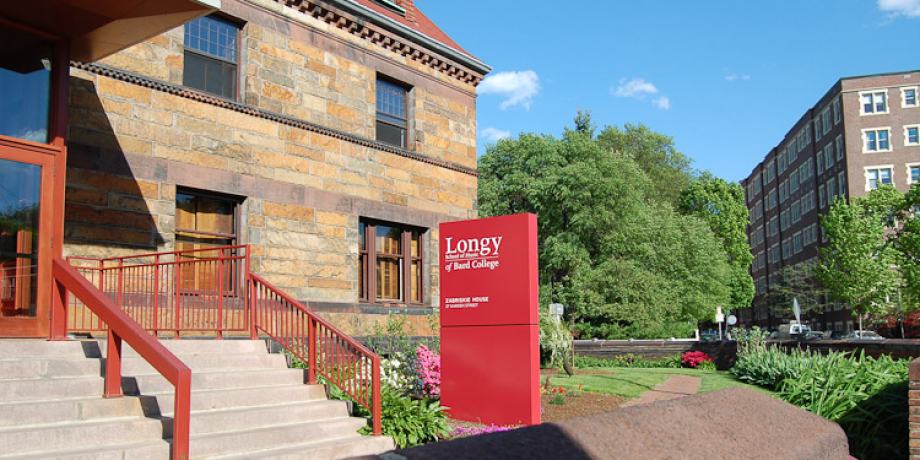
The Longy School of Music of Bard College
For students who are considering becoming a composer or an expert of music theory, I might suggest the Longy School.
The student body of Longy is incredibly small – according to their website, there were only just 217 students in 2015. That means admission at the school is extremely competitive, but the potential benefit to future composers and classical musicians by slugging it out at Longy can yield life-long benefits.
5. Boston University
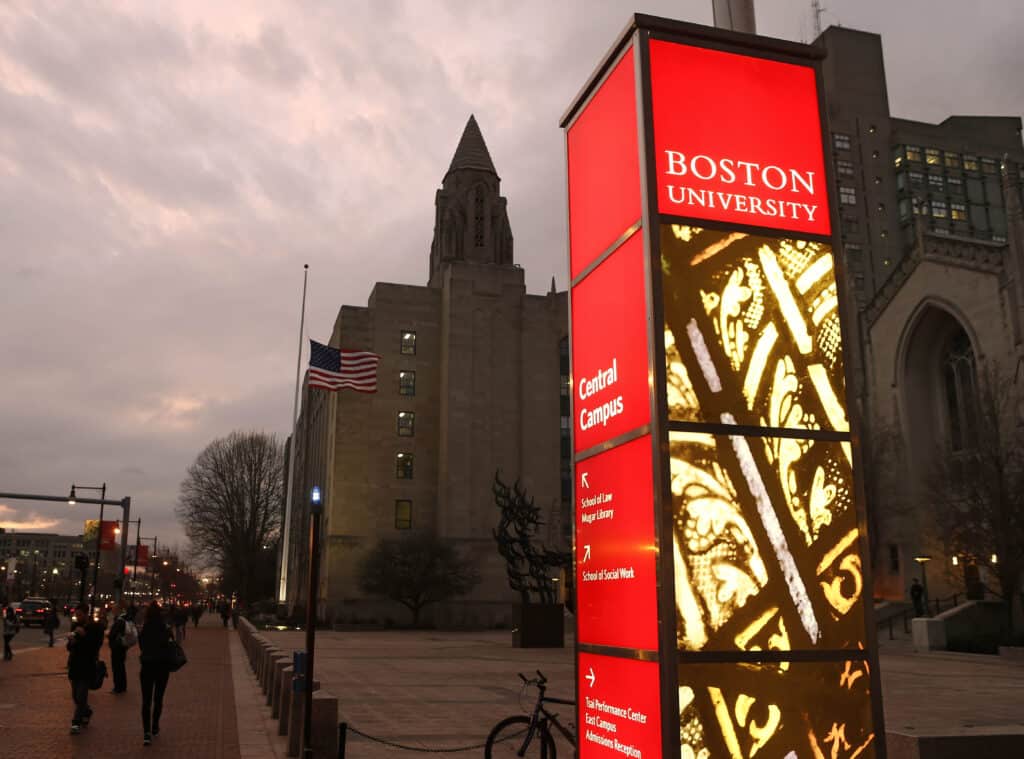
In terms of a well-rounded education, there’s almost no better choice than Boston University.
While the audition process is less competitive than, say, Berklee or the conservatories, Boston University is a great school for people with a wide array of musical interests.
Here’s the caveat – I would consider the opera, theater, and classical performance programs as absolutely outstanding. Studying any of these fields at the university would leave you well prepared for a career in professional music.
Along with a standard Bachelor of Arts in Music and performance degrees, Boston University offers interesting majors such as Historical Performance. It’s an absolutely massive school – with about 34,000 students – and offers a lot of undergraduate and graduate music programs for a school that is not known for its music programming.
6. Harvard University Department of Music
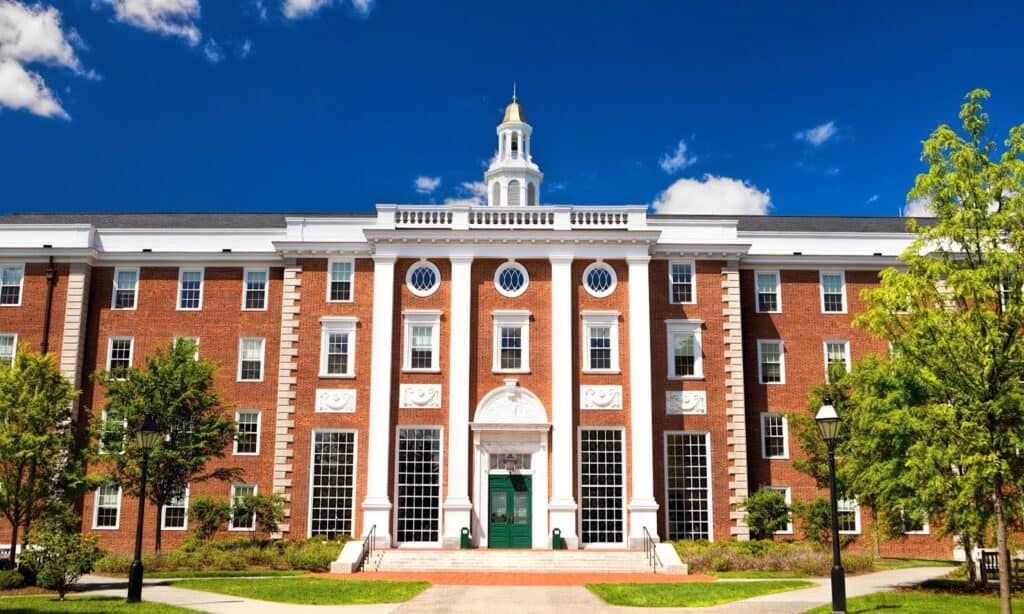
Harvard University is not a school to study music performance – in fact, they don’t even offer a performance major.
The musical value of a Harvard education is in its musical sciences, such as ethnomusicology and musicology, as well as rigorous programs in composition, theory, and others. Still, the university’s music department has one of the best vocal and choral music programs around.
Yet Harvard is not a place where players are discouraged to attend – the extra curricular activities to be had include jazz bands and other genres where top-rated musicians bring their skills into free and open performances.
7. Northeastern University
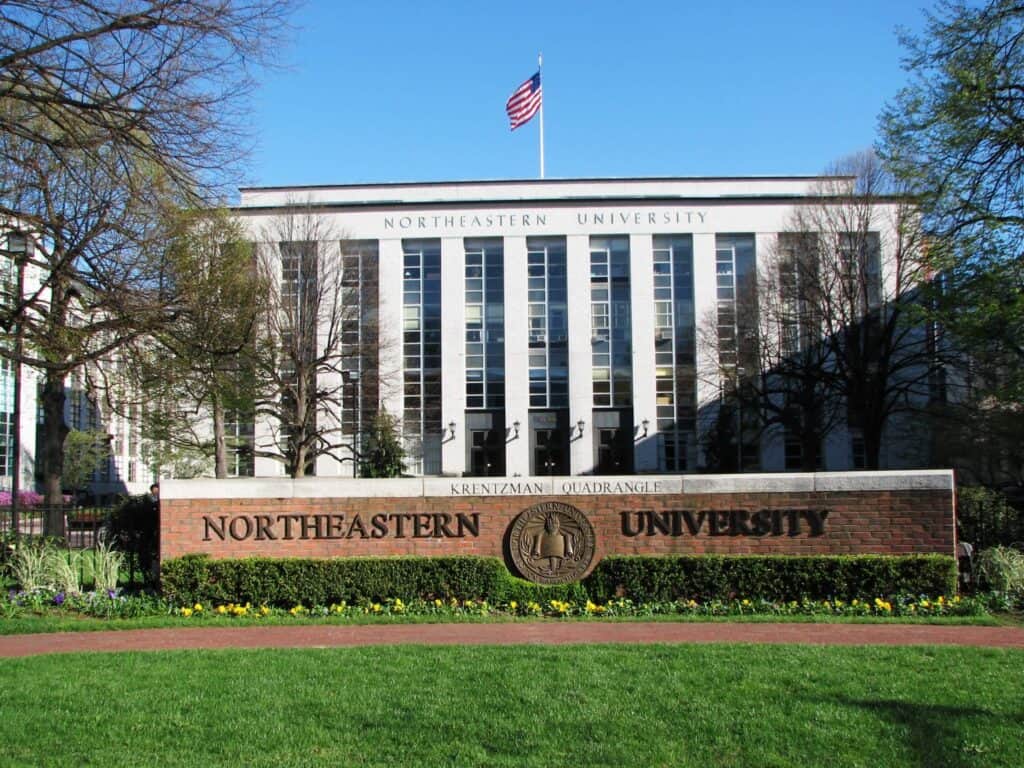
I would say that if technology is your thing, do not pass over Northeastern University as an option.
Yes, it’s not a “music school” per se, but if you take a look at the majors and minors available, there’s something to be said about the technologically rich approach to the study of music that can’t be discounted.
Fields of study that integrate technology in a novel way include their Computer Science and Music Bachelor of Science, their Game Design and Music Bachelor of Science, and more. See the link above to read about more of their interesting majors.
Alright now, take a breath!
In the end, it’s a difficult task to narrow down the best music schools for all types of interests and career paths. What’s most important amid all the confusion is that you make the right choice for you.
That’s where I can help – as someone who is an “insider” in the music school admissions business, my expertise is invaluable for the student who is not just looking for getting into the best music school, but the right one.
It’s all about knowing you, your goals, and how you stack up against the competition. With my years of experience behind you, you’ll be on your way to pursuing the right music program for you.
Founder & President at Inside Music Schools | Insidemusicschools.com
Head of admissions and faculty member at Berklee College of Music for 40 years, Steve Lipman and our team at Inside Music Schools speak music as their primary language. We approach each client contact with open eyes, ears, and minds. As the country’s premier music school consultant, he has advised students from the United States, Canada, the U.K., India, Singapore, Dubai, China, Australia, Turkey, Colombia, Argentina, Brazil, Japan, Israel, Italy, Russia and elsewhere.

